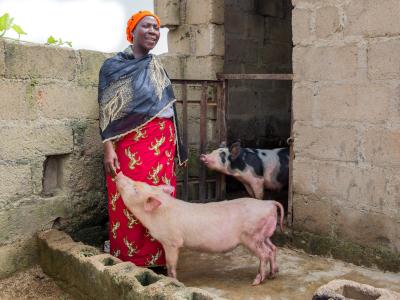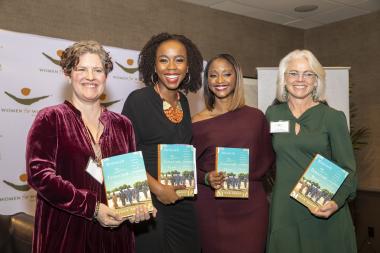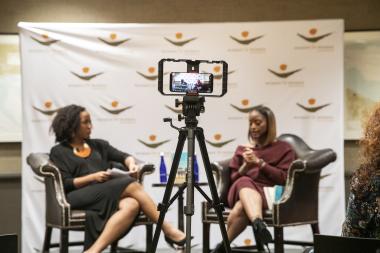Whatever happened to the girls Boko Haram kidnapped? On December 4, we sat down with award-winning journalist Isha Sesay to discuss her book following the girls’ experiences, Beneath the Tamarind Tree: A Story of Courage, Family, and the Lost Schoolgirls of Boko Haram.
Isha’s commitment to these girls and their voices revealed the injustice dealt to them because of their gender while also showing the resilience and power of women and girls, even in the face of adversity.
Joined by Zinhle Essamuah as moderator for the conversation, Isha shared how the Nigerian media and government failed the girls taken from their school in Chibok. Due to a heated election year, government officials disbelieved accounts of the kidnapping and dismissed them as a hoax to disgrace the current president. Media perpetuated falsehoods about the situation being resolved – if they even reported there was a situation.
But ultimately, many in the country collectively felt that the safety and plight of these girls wasn’t important enough to care about because Chibok is a poor farming community and simply because they were girls.
Isha lamented the way these girls were turned into pawns when they were pursuing an education. Her book and talk highlight the importance of education for girls to have power through the lens of her own mother from Sierra Leone who rose to help rewrite her home country’s constitution and become the first woman to run on a ticket as vice president.
“I told my mother’s story because I want people to understand that when they advocate for education and when they talk about the loss these girls have endured by being denied education, I come at it from a personal place.”
She shared that many of the girls that have returned are back in school, continuing their education.
When Isha asked the girls how they feel about the future and their aspirations, one girl replied, "I don't know exactly what I want to do but I know that I'll be someone in this world."
The girls taken by Boko Haram and their families have lived through much trauma but Isha speaks to the strength of women and girls in the face of adversity.
"I see this as a story of overcoming, of hope and resilience and the tenacity of girls — not just these girls but every girl, given the opportunity," Isha said.
Isha reminded the audience that as the sixth anniversary of the abduction looms, people can still take action by continuing conversations about these girls to bring them home and demonstrate that girls' education and safety matter.
"Let's keep the story alive."
Women for Women International’s Vice President of Program, Marie Clarke, followed by sharing the global challenge of 280 million women living at the intersection of conflict, extreme poverty, and gender discrimination who endure horrors like those the Chibok girls experienced.
When women and girls have power, Marie explained, they become the solution. They help bring social cohesion and help peace negotiations last longer.
A unique shopping experience punctuated both ends of the conversation, with special thanks to THE OUTNET. As our partner, THE OUTNET contributed several pieces of clothing in the latest trends for guests to purchase – with 100 percent of the proceeds benefiting Women for Women International.
The support of sponsors like THE OUTNET and Capital One, our other partner for the evening, is crucial to hundreds of women in our programs. Their commitment and contributions provide women living in conflict, poverty, and discrimination with access to the resources, tools, knowledge, and skills to transform their lives.
Women for Women International’s programs create collective spaces where women realize their power and grow it. “Once a woman experiences that power, the thing that makes it transformative for the rest of the community is that she shares it,” said Marie.
“Women know that power, like love, grows when it’s shared. They share it with other women. They share it with their sisters, and their sons and their daughters. They are living that ripple effect.”
Watch our video on Facebook from the event to learn more about the barriers women and girls face in Nigeria and around the world – and that you can help create a ripple effect.




